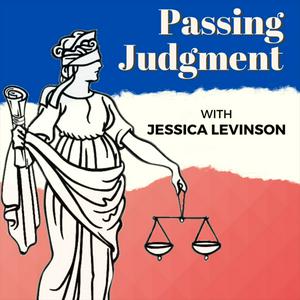363 episodes

Federal Court Blocks Trump Administration’s Funding Freeze Against UCLA and UC System
11/19/2025 | 10 mins.
In this episode of Passing Judgment, Jessica Levinson unpacks a significant federal court decision blocking the Trump administration from withholding or conditioning federal funds to UCLA in exchange for major campus policy changes. The discussion covers the court's reasoning under the Administrative Procedures Act, the First and 10th Amendments, and why the judge deemed the administration’s actions coercive. Join us for a breakdown of this breaking legal news and its broader implications for university autonomy.Here are three key takeaways from the episode:Federal Funding Leverage Challenged: A federal judge issued a preliminary injunction preventing the Trump administration from freezing, terminating, or conditioning UC research funds—pointing out that the administration’s approach may violate legal requirements, including the Administrative Procedures Act, the First Amendment, and the Tenth Amendment.Academic Freedom & Speech Protected: The court found that forcing changes to speech policies, DEI efforts, gender healthcare, protest rules, and admissions could unlawfully coerce universities and chill free speech, especially among public university faculty and students.States’ Rights and Spending Clause Limits: The judge ruled that federal conditions on funding can’t be so extreme they essentially take away states’ ability to decide their own policies—a “gun to the head” tactic that threatens economic stability and state sovereignty.Follow Our Host: @LevinsonJessica

Inside Chicago’s Ongoing ICE Raids with Renee Hickman
11/04/2025 | 24 mins.
In this episode of Passing Judgment, we examine the escalating ICE raids and federal enforcement actions in Chicago, joined by Reuters reporter Renee Hickman. Together with Jessica Levinson, the episode explores fatal encounters involving federal agents, disputes over official narratives, and the controversies surrounding body camera requirements. We also discuss daily judicial oversight of law enforcement, its unique legal status, and challenges to the president’s order to deploy the National Guard. Tune in for a closer look at the clash between community resistance, federal enforcement, and ongoing legal battles on Chicago’s streets.Here are three key takeaways from the episode:1. Fatal Shooting Involving ICE Agents: The episode opens with the recent ICE raids in Chicago, focusing on a fatal shooting involving an ICE agent and Silverio Villegas Gonzalez, a Mexican national. The circumstances are contested, with DHS claiming agents felt threatened, while surveillance and police records suggest otherwise. This incident marks the most violent encounter since the start of the Trump administration’s Operation Midway Blitz.2. Disputed Narratives and Lack of Accountability: Renee highlights the conflicting narratives between federal agencies and victims’ families, particularly in the cases of fatal shootings or injuries during enforcement actions. There’s an ongoing lack of clarity and accountability due to delayed or restricted investigations, including an internal probe that may be impacted by a government shutdown.3. Judicial Oversight of Federal Agents: A rare level of judicial supervision has been imposed, compelling federal agents to report daily to a judge about any use-of-force incidents. This oversight stems from lawsuits by protesters, journalists, clergy, and others who allege excessive force during raids and demonstrations. The order has since been stayed by the 7th Circuit Court of Appeals, so the future of this oversight is uncertain.Follow Our Host: @LevinsonJessica

Voting Rights Under Threat? Inside the Supreme Court’s Louisiana Redistricting Review with Hansi Lo Wang
10/28/2025 | 27 mins.
In this episode of Passing Judgment, we tackle the Supreme Court battle over Louisiana’s redistricting and its far-reaching implications for voting rights. Host Jessica Levinson and NPR’s Hansi Lo Wang unpack the legal fight over Section 2 of the Voting Rights Act, explaining how redistricting shapes the power of racial minorities and the future of partisan gerrymandering. Join us as we break down what’s at stake for Congress, the states, and the promise of equal representation.Here are three key takeaways from the episode:Redistricting = Real Voting Power: How district lines are drawn can dramatically dilute or amplify your vote. Redistricting is a complex, often opaque process with huge, tangible consequences for representation.Supreme Court Decisions Have National Impact: The outcome of Louisiana’s case (and similar cases) could directly affect minority representation in Congress and potentially lock in partisan advantages for years to come.Tension Between Race & Partisan Politics: The debate isn’t just about protecting minority voters. The Court is grappling with whether racial considerations in redistricting are required or unconstitutional, especially since partisan gerrymandering is now out of reach for federal courts.Follow Our Host: @LevinsonJessica

Voting Rights Act on the Line: What’s Really at Stake in the Supreme Court Case with Jan Wolfe
10/22/2025 | 30 mins.
In this episode of Passing Judgment, host Jessica Levinson welcomes Jan Wolfe of Reuters to break down a major Supreme Court case that could reshape voting rights nationwide. They discuss how a challenge to Louisiana’s congressional map escalated into a broader attack on Section 2 of the Voting Rights Act—one of the remaining federal protections against racial discrimination in voting. Jan and Jessica unravel the complexities of the case, the Supreme Court’s skepticism, and the potential consequences: from narrowing how race can be considered in redistricting, to making it much harder to bring successful claims under Section 2. The episode also takes a look at other high-profile cases on the Supreme Court’s docket, including questions of executive power and social issues, highlighting the legal and political stakes at play this term.Here are three key takeaways from the episode:Section 2 of the Voting Rights Act is at a crossroads:Following the Supreme Court’s 2013 Shelby County decision (which gutted Section 5 preclearance provisions), Section 2 remains the primary tool to challenge racially discriminatory voting practices. This case could either hobble or maintain its effectiveness, depending on how the justices rule.The current dispute reflects broader battles over race and "colorblindness":The case sits at the intersection of redistricting and the recent trend in the Court toward a “colorblind” constitutional interpretation—reminiscent of last year’s affirmative action ruling. The outcome could make it significantly harder to prove voting power is being diluted due to race, with huge consequences for minority representation.The Court's decision may have national ripple effects—or remain narrow:While the justices have options ranging from a sweeping redefinition of Section 2 to a narrow ruling specific to Louisiana, the oral arguments showed splintering among conservatives and uncertainty about the ultimate path forward. Watch for possible “off ramps” that limit the case’s impact nationally.Follow Our Host: @LevinsonJessica

Breaking Down James Comey's Arraignment and Defense Strategies in Federal Court
10/10/2025 | 10 mins.
In this episode of Passing Judgment, we cover the arraignment of former FBI Director James Comey. Host Jessica Levinson explains the charges against Comey and outlines his defense strategies, including claims of vindictive prosecution and challenges to the validity of the prosecutor’s appointment. Tune in as Jessica breaks down the legal complexities and what this high-profile case means for the broader landscape of justice.Here are three key takeaways from the episode:Challenge to Validity of Appointment: Comey’s defense intends to argue that the U.S. attorney who brought the indictment, Lindsey Halligan, may not have been validly appointed. If successful, the charges can't simply be refiled due to the expiration of the statute of limitations.Selective and Vindictive Prosecution Motions: The defense plans to file motions asserting that the prosecution was brought with political animus and lacked objective justification—raising important questions about equal protection and due process under the law.High Bar for Prosecution: To secure a conviction, prosecutors must prove that Comey knowingly made false statements and intentionally obstructed Congress—standards that can be difficult to meet, especially with the complex context and timing of the indictment.Follow Our Host: @LevinsonJessica
More Arts podcasts
Trending Arts podcasts
About Passing Judgment
Listen to Passing Judgment, Spooked and many other podcasts from around the world with the radio.net app

Get the free radio.net app
- Stations and podcasts to bookmark
- Stream via Wi-Fi or Bluetooth
- Supports Carplay & Android Auto
- Many other app features
Get the free radio.net app
- Stations and podcasts to bookmark
- Stream via Wi-Fi or Bluetooth
- Supports Carplay & Android Auto
- Many other app features


Passing Judgment
download the app,
start listening.






































